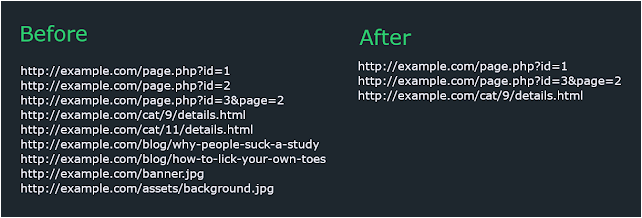Uro – Declutters Url Lists For Crawling/Pentesting
Using a URL list for security testing can be painful as there are a lot of URLs that have uninteresting/duplicate content; uro aims to solve that.
It doesn’t make any http requests to the URLs and removes: – incremental urls e.g. /page/1/ and /page/2/ – blog posts and similar human written content e.g. /posts/a-brief-history-of-time – urls with same path but parameter value difference e.g. /page.php?id=1 and /page.php?id=2 – images, js, css and other “useless” files
Installation
The recommended way to install uro is as follows:
pipx install uro
Note: If you are using an older version of python, use
pipinstead ofpipx
Basic Usage
The quickest way to include uro in your workflow is to feed it data through stdin and print it to your terminal.
cat urls.txt | uro
Advanced usage
Reading urls from a file (-i/–input)
uro -i input.txt
Writing urls to a file (-o/–output)
If the file already exists, uro will not overwrite the contents. Otherwise, it will create a new file.
uro -i input.txt -o output.txt
Whitelist (-w/--whitelist)
uro will ignore all other extensions except the ones provided.
uro -w php asp html
Note: Extensionless pages e.g. /books/1 will still be included. To remove them too, use --filter hasext.
Blacklist (-b/--blacklist)
uro will ignore the given extensions.
uro -b jpg png js pdf
Note: uro has a list of “useless” extensions which it removes by default; that list will be overridden by whatever extensions you provide through blacklist option. Extensionless pages e.g. /books/1 will still be included. To remove them too, use --filter hasext.
Filters (-f/–filters)
For granular control, uro supports the following filters:
- hasparams: only output urls that have query parameters e.g.
http://example.com/page.php?id= - noparams: only output urls that have no query parameters e.g.
http://example.com/page.php - hasext: only output urls that have extensions e.g.
http://example.com/page.php - noext: only output urls that have no extensions e.g.
http://example.com/page - allexts: don’t remove any page based on extension e.g. keep
.jpgwhich would be removed otherwise - keepcontent: keep human written content e.g. blogs.
- keepslash: don’t remove trailing slash from urls e.g.
http://example.com/page/ - vuln: only output urls with parameters that are know to be vulnerable. More info.
Example: uro --filters hasexts hasparams
Original Source: kitploit.com
A considerable amount of time and effort goes into maintaining this website, creating backend automation and creating new features and content for you to make actionable intelligence decisions. Everyone that supports the site helps enable new functionality.
If you like the site, please support us on “Patreon” or “Buy Me A Coffee” using the buttons below
To keep up to date follow us on the below channels.


![[Palo Alto Networks Security Advisories] PAN-SA-2025-0016 Chromium: Monthly Vulnerability Update (October 2025) 2 Palo_Alto_Networks_Logo](https://www.redpacketsecurity.com/wp-content/uploads/2025/02/Palo_Alto_Networks_Logo-300x55.png)

